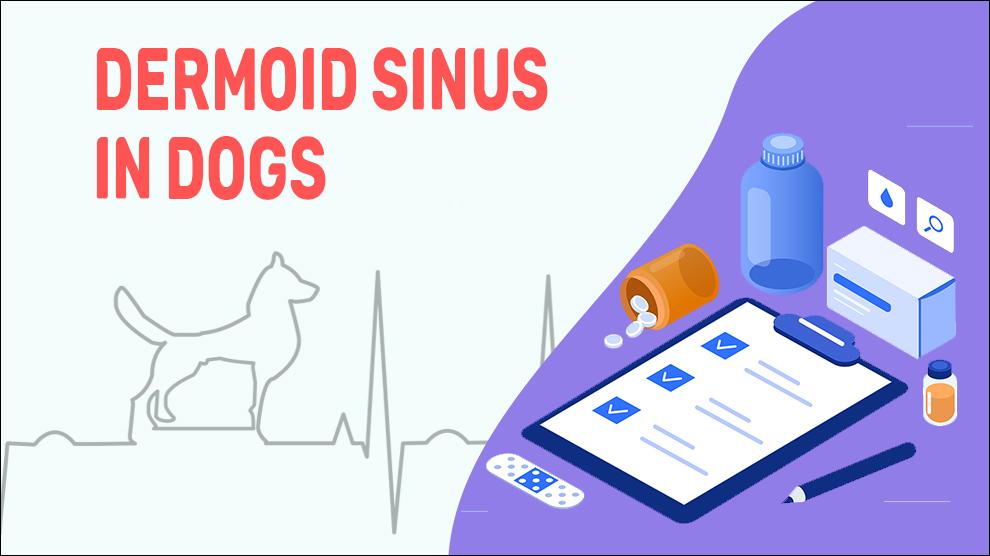Dermoid sinus (DS) in dogs is an autosomal, recessively inherited, developmental anomaly that results in the dermoid sinus (tubular indentation) of the skin on the dorsal midline, usually along the center of the back of the dog.
Also called as also known as pilonidal sinus, Dermoid neural tubes can dig deep into underlying tissues and the affected animals are exposed to the risk of infections causing serious pain, and possibly developing an abscess and disease. The depth of this penetration into the tissue below varies between animals. The track may extend into the tissue just underneath the skin or may run deeper and attach to the dura mater (outer layer covering the spinal cord) or it is just a blind-ending sinus tract beneath the skin
Category IV sinuses pose a life-threatening risk as they connect with the spinal cord and pose a risk of infections to the delicate nervous tissues.
Dermoid sinus is a cyst-like condition that can be found at birth and can be typically found along the dog’s upper spine, tail, and neck. This is prevalent among Rhodesian ridgebacks or ridgeback-crosses and recently this has been found in other breeds as well. These tubes are intended to drain out hair, tissues, and dead cells. This is a developmental glitch that does not form during embryonic development correctly.
The affected region typically will not cause any pain to the pet unless they become inflamed or infected. Protruding hair, often in a swirl hair pattern at the site or any slight discharge in the area can be used to spot a DS.
Symptoms Of Dermoid Sinus
- Draining tracts along the upper spine with a swirling hair pattern (can be spotted as early as 4-6 weeks)
- Cysts like swellings or tubes or holes under the skin along the dog’s back
- Single or multiple openings
- Mild discharge without any other symptoms
- Abscesses/Infection
- Spinal pain
- Rigidity
Treatment Options For Dermoid Sinus
- Treatment is not necessary for most of the Dermoid sinus. However, rarely do cysts get large and cause discomfort or other symptoms, then they will be drained or surgically removed.
- Pain medications such as carprofen (Novox or Rimadyl), firocoxib (Previcox), grapipant (Galliprant), deracoxib (Deramaxx), meloxicam (Metacam) etc.
- Antibiotics, if a secondary bacterial infection is suspected.
- Other drugs and the need for surgery will be entirely on your vets’ disposal after determining the severity of dermoid sinus.
Home Remedies For Dermoid Sinus
Check with your veterinarian for post-surgical checks, usually once a month to ensure the health of the dog and to check for any infection.
Until the post-operative recovery period is over, do not allow your dogs to play outdoors. This will reduce the risk of infection and injuring the surgical site.
Prevention Of Dermoid Sinus
- Dermoid sinus has been linked to an inherited autosomal recessive gene. Therefore, the best method of prevention is responsible breeding practices.
- Breeders should keep track of lineages with the lower-grade forms of this disease and stop breeding the dogs.
Affected Breeds Of Dermoid Sinus
Additional Facts For Dermoid Sinus
1. Causes:
This is an autosomal recessive inheritance, which means to for the condition to occur only in the puppies, only one copy has to be transmitted. When the carrier dog is bred with a healthy one, the offsprings have a 50% chance of inheriting this syndrome. This is prevalent among Rhodesian Ridgebacks and Thai Ridgeback dog breeds.
2. Types:
Category I
- Tube shaped sac
- Extends towards the abdomen region
Category II
- The sac is found in closer proximity to the skin surface than Type I
Category III
- Superficial sac with no attachments
Category IV
- The tract extends deeper and communicates with the spinal dura mater
Category V
- The cyst is lined with epithelium
- This type of DS is the only “true” cyst
3. Mortality:
Young dogs may get affected due to the inflammation of DS. Although there is no cure, dermoid sinus is usually not fatal.
4. Diagnosis:
- Complete physical exam, Biochemical analysis, complete blood count
- X- rays
- Fistulogram
- Myelogram
5. Prognosis:
The prognosis for Dermoid sinus is really good. As the existing condition is not life-threatening, no rigorous treatment is usually necessary. However, DS complicated by the spinal cord or spinal canal infections carry a poor prognosis.
Relapse of infections is possible following medical treatment in affected dogs. Proper hygiene and home care are the best defenses against future recurrences.
When To See A Vet
Contact your vet right away, if you notice any of the following:
- Draining tracts along the upper spine with a swirling hair pattern
- Cysts like swellings or tubes or holes under the skin along the dog’s back
Food Suggestions For Dermoid Sinus
Foods to avoid:
- Avoid fatty foods or high in fiber
- Cutback on greasy, oily, spicy foods
- Avoid crunchy or chewy snack foods
- Avoid dairy products like milk, yogurt, etc
- Bread products and roasted nuts
- Avoid tougher meats
What to feed:
- Smaller, more frequent meals of a high-quality, high-calorie food
- Choose softer foods such as mashed, soft, or pureed foods
- Moisten/soften foods with chicken broth, gravy, or butter
- Finely chop up veggies, chicken, or meat
- Watch the salt intake of dogs such as from canned soups or frozen meals
- Add calcium-rich foods and supplements such as like broccoli, salmon, Sardines, and Dark leafy greens
Conclusion
Mostly, dermoid sinus infections are treatable and are not fatal to the dog. However, untreated infections may lead to other complications meningitis, myelitis, etc. At the time of diagnosis, if there is any neurologic signs are present then the dog may be left with permanent changes regardless of remedial surgery.

















